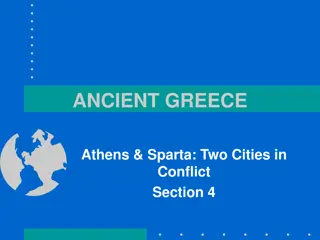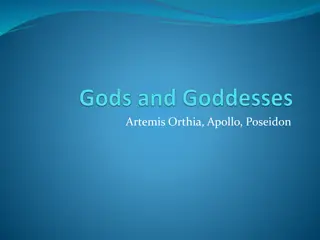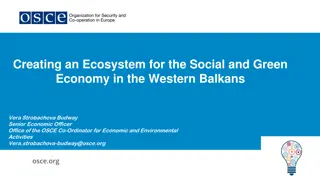Spartan Economy and Society: A Closer Look
The Spartan economy was characterized by strict state control, limited property rights, and a focus on meeting basic needs through a barter system. Land ownership reforms aimed to address wealth inequality, providing each citizen with an equal share of land. While the system promoted stability and virtues valued by the Spartans, challenges arose over time. The economy played a significant role in shaping Spartan society and lifestyle.
Uploaded on Sep 21, 2024 | 1 Views
Download Presentation

Please find below an Image/Link to download the presentation.
The content on the website is provided AS IS for your information and personal use only. It may not be sold, licensed, or shared on other websites without obtaining consent from the author.If you encounter any issues during the download, it is possible that the publisher has removed the file from their server.
You are allowed to download the files provided on this website for personal or commercial use, subject to the condition that they are used lawfully. All files are the property of their respective owners.
The content on the website is provided AS IS for your information and personal use only. It may not be sold, licensed, or shared on other websites without obtaining consent from the author.
E N D
Presentation Transcript
SPARTAN ECONOMY The State Controls every aspect of economic life, Property Economic activity Inequalities of wealth, although they exist, are treated as an aberration. Economy is rather primitive Currency system iron Barter Cater to basic needs Citizenship = pay one s way in the messes, and Spartans who cannot pay their way become Inferiors (hypomeiones). Property is privately owned, but with restrictions. Until the 5thc. one cannot dispose of it as they wish, and the helots are the property of the state.
LAND OWNERSHIP LAND OWNERSHIP PLUTARCH S VERSION PLUTARCH S VERSION "Lycurgus' second, and most revolutionary, reform was his redistribution of the land. For there was dreadful inequality: many destitute people without means were congregating in the city, while wealth had poured completely into just a few hands. In order to expel arrogance, envy, In order to expel arrogance, envy, crime, luxury and those yet older and more serious political afflictions, crime, luxury and those yet older and more serious political afflictions, wealth and poverty wealth and poverty, Lycurgus persuaded the citizens to pool all the land and then redistribute it afresh and then redistribute it afresh. Then they would all live on equal terms with one another, with the same amount of property same amount of property to support each, and they would seek to be first only in merit. There would be no distinction or inequality between individuals distinction or inequality between individuals except for what censure of bad conduct or praise of good would determine. pool all the land no
THE ECONOMY OF SPARTA UNTIL THE 5TH C. Even before the conquest of Messenia, the land of Laconia had been divided to 9000 lots, roughly equal in productivity. A lot had the potential to produce approximately 100 medimnoi (= 30 metric tons) of wheat The average field yields 50 bushels per acker (1 bushel = 27.2 kg) namely 1360 kg. Thus the average lot should be approximately 22 ackers. To maintain full citizenship a Spartan needed to provide the following to the mess every month: 1 medimnos of barley (1 medimnos = c. 30 kg) 96 cups of wine (e.g. 3 cups a day) 5 minae (= 2 kg) of cheese 2 minae (= 1.25 kg) of figs a very small amount of money for other purchases
THE ADVANTAGES OF THE SYSTEM For a long time, in the years of growth of Spartan power, the system served the Spartans well. It provided Economic stability and predictability Time to pursue military excellence Social cohesion Equality and virtue which the Spartans desired and honored. The so characteristically Spartan lifestyle of having one s needs satisfied without excess or luxury.
THE RHETRA OF EPITADEUS (5TH CENTURY BC) However there were disadvantages too: Gradually more and more Spartans found it harder to find lots (mothakes) Gradually more and more Spartans fell into the ranks of the Inferiors The system was too inflexible to address the needs of a changing world, where powers like rival Athens were building economic empires, and where wealth meant strength. Thus in the 5th century there was a significant reform introduced by the ephor Epitadeus The rhetra (constitutional amendment) of Epitadeus allowed each Spartan to make a will and leave his property to whoever he wished. We are told that the motives of Epitadeus were personal, but the Spartans accepted the law as a solution to mounting economic and social problems.
THE RESULT Inflexible economic system and greed = catastrophic result The sale of lots until then prohibited became a reality (probably in the form of bequests). Some people accumulated a large amount of property, while most others lost their citizenship and became Inferiors. By the 3rd century only 700 full Spartan citizens remained. remained. 700 full Spartan citizens Aristotle - 2/5 of Sparta s property was owned by women More problems More property owned by women meant fewer men with full citizenship. Spartan officials and ambassadors - prone to bribery, corruption and increasing luxury In Sparta the link between citizenship and landownership was never severed, and this was the undoing of Sparta. By the 370 s it was painfully obvious that this link was reducing the number of Spartan citizens, swelling the numbers of dissatisfied inferiors and creating inequalities and difficulties which the Spartan system was not equipped to accommodate. Aristotle (The Politics Bk2 Ch9): "For we find that some Spartans have far too much property, others very little indeed; the land has come into the posession of a small number... For their lawgiver... left it open for anyone to transfer land to other ownership by gift or bequest... Moreover, something like two-fifths of all the land is possessed by women... But it is obvious that if many sons are born and the land distributed accordingly, many must inevitably become poorer."
HSC 2012 Describe how land ownership was organised in Sparta in this period. (5 marks) Land system as described by Lycurgus Organisation Advantages Purpose Problems with ownership Modern Aristotle Declining numbers of citizens Problems with inheritance ANCIENT SOURCES: Plutarch Aristotle MODERN SOOURCES: Michell Hodkinson In better responses, candidates wrote an informed and detailed description organisation of land in Sparta and considered a wide range of different land ownership examples from the sources examples from the sources. In weaker responses, candidates referred to a limited number of examples. Some considered only one type of land ownership. informed and detailed description of the a wide range of different land ownership























